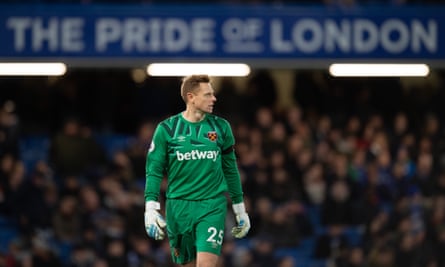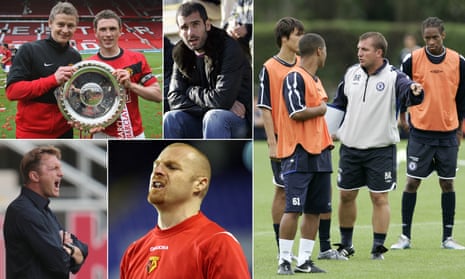Three Premier League teams will be led by temporary managers this weekend – and all three learned the ropes by coaching younger players at those clubs. Duncan Ferguson first coached as a volunteer in Everton’s academy under David Moyes; Hayden Mullins was working as the Watford Under-23s coach when Quique Sánchez Flores was sacked this week; and Freddie Ljungberg started his coaching career with Arsenal Under-15s back in 2006, before returning to the club to lead the Under-23s. These promotions for Ferguson, Ljungberg and Mullins mean that 15 Premier League clubs will be led this weekend by managers who started their careers with youth teams, reserves or part-time sides.
Brendan Rodgers (Reading and Chelsea), Dean Smith (Leyton Orient), Eddie Howe (Bournemouth), Sean Dyche (Watford), Ralph Hasenhüttl (Unterhaching) and José Mourinho (Vitória de Setúbal) all started their careers coaching youth teams.
Chris Wilder and Daniel Farke were given their first jobs by semi-professional clubs (Wilder began at Alfreton in the Northern Counties East League and Farke started in Germany’s sixth tier). Roy Hodgson gained invaluable experience with Oddevold in Sweden’s semi-pro third-tier, having already taken minnows Halmstads to two Swedish titles in his first job. Graham Potter started out by coaching students in Hull. Ole Gunnar Solskjær was given his first job at the Manchester United academy. And Pep Guardiola learned the ropes with Barcelona B.
That leaves just Steve Bruce, Manuel Pellegrini, Jürgen Klopp, Nuno Espírito Santo (who started as a goalkeeper coach at Málaga) and Frank Lampard – although he did write books for youngsters before taking his first job in management at Derby County.
Coaches working in academies have different strengths. Some will become experts at bringing through talented youngsters and producing future first-team players. Others will learn the art of managing a squad of differing personalities, getting the best out of a range of characters on and off the field. And some are tactical experts who learn how to prepare a team for matches and coach them through games.
The first type tend to have a career in academies, enjoying jobs that offer stability, respect inside the game and anonymity outside it. Paul Driver is a good example. Having coached youth teams at Rushden & Diamonds, Luton Town and Doncaster Rovers, Driver was delighted to see one of his former trainees, Luton product James Justin, making his Premier League debut for Leicester on Wednesday night
. The latter two styles are more likely to find opportunities with first teams, bringing them profile, large salaries and short-term futures in highly volatile environments. But they all have one thing in common: they all benefit from learning how to become a manager or coach out of the limelight, where mistakes have fewer consequences and failures go unnoticed outside of a small work circle.
There is a change coming. Until recently, almost every top manager was a former professional player. Or an ex-teacher. Sometimes both. There were very few exceptions. They knew the game, could relate to young men, and organise and deliver lessons to large restless groups.
Nearly a decade after the launch of the Elite Player Performance Plan, Category 1 academies (mainly Premier League clubs) have over 30 staff. Category 2 (mainly Championship) clubs have more than half that, with perhaps a dozen staff at Category 3 clubs in the lower divisions.
At each of these levels, most of the staff are men in their 20s, working extremely long hours and paid less than their mates in supposedly less glamorous jobs. That includes the coaches, many of whom have never played professional football – or been teachers.
There are now dozens of coaches in academies, some working with Under-18 or even 23s teams, who have not experienced being a player at that level, let alone first team. That does not make them worse coaches, but it does make them different. What they do know is that they are on a pathway that is increasingly likely to lead to opportunities at the very top – if they can hang in there long enough.
Remember me?
Goalkeeper David Martin rightly grabbed headlines last weekend when he helped West Ham beat Chelsea on his Premier League debut, aged 33. Last year, Martin was in goal for Millwall Under-23s at humble venues such as Princes Park in Dartford. He has experienced very different footballing worlds in his career. Martin started out as a defender in the Tottenham youth team before becoming an apprentice goalkeeper at Wimbledon and then making a senior breakthrough after they became MK Dons. He made a surprise move to Liverpool in 2006 but was mainly used in the reserves. After a string of loans, mainly as emergency cover, he returned to Milton Keynes to become an established lower league keeper. After stint with Millwall, a switch to West Ham in the summer proved irresistible. Now this!

Fantasy football
Twelve years after being in the Northern Premier League, Fleetwood Town beat Everton 4-0 at Goodison Park. OK, they would rather it had been against the first team rather than smashing David Unsworth’s Under-21s in the EFL Trophy in front of 624 spectators rattling around Goodison. But still they hugely enjoyed a trip to a Premier League stadium, albeit an empty one in a competition many think their hosts do not belong.
Newport also won on Premier League turf, beating Brighton on penalties at the Amex. Elsewhere, Tranmere, Walsall and Salford all ended the hops of Manchester United, Chelsea and Wolves’ Under-21s in the competition. The contentious possibility remains that Manchester City or Leicester could reach the Wembley final, but there are no Premier League 2 teams among the eight clubs left in the southern half of the draw.
Next man up
There’s a big meeting between the top two teams in the Premier League 2 at Aldershot on Saturday. Derby County are just one point behind Chelsea in the league, thanks in part to 10 goals from Jahmal Hector-Ingram, who they signed from West Ham in the summer.
The 21-year-old striker won the Premier League 2 player of the month for October and scored twice as Derby smashed Leeds 7-1 in the Premier League Cup. He could have scored a hat-trick in that game but generously gave his teammate, Louie Sibley, a penalty so he could complete his own treble. The young forward is some way off reaching the Derby first team. Phillip Cocu has not yet given him a squad number.
This week in … 1994
Manchester City reserves won 1-0 at Preston North End in the Central League thanks to the wind. A headed clearance by Preston defender Ryan Kidd blew to City winger Scott Thomas, whose cross drifted in for the only goal of the game. City almost doubled their lead through a header by Michael Vonk and future Jamaica World Cup midfielder Fitzroy Simpson played 90 minutes. In front of 1,619 at Deepdale, Preston’s new manager, Gary Peters, watched from the dugout with his assistant coach, a certain David Moyes.
Follow Gavin Willacy and Playing in the Shadows on Twitter

Comments (…)
Sign in or create your Guardian account to join the discussion